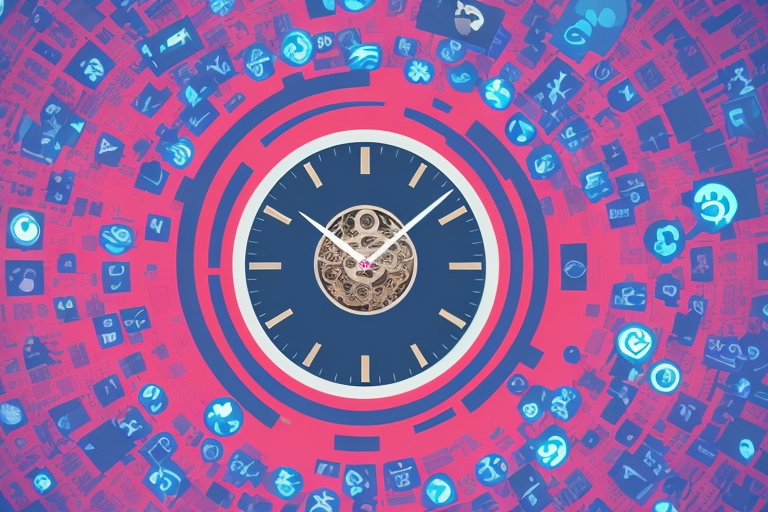The Dark Side of Social Media: How It Affects Your Mental Health
Social media has become an integral part of our daily lives. We use it to connect with friends and family, share our thoughts and experiences, and stay up-to-date with the latest news and trends. However, the constant use of social media has a negative impact on our mental health. Studies have shown that social media use is linked to anxiety, depression, low self-esteem, poor sleep, and decreased productivity.
According to a survey conducted by the Royal Society for Public Health, social media is the most damaging form of communication when it comes to young people’s mental health. The survey found that social media use is associated with increased rates of anxiety, depression, poor sleep, and body image issues. Another study conducted by the University of Pennsylvania found that limiting social media use to 30 minutes a day can significantly reduce symptoms of depression and loneliness.
The constant need for validation and comparison on social media can lead to low self-esteem and a negative body image. We often compare ourselves to others, who seem to have a perfect life, which can lead to feelings of inadequacy and self-doubt. Social media can also be a breeding ground for cyberbullying, which can have a devastating effect on mental health.
Social media use can also affect our sleep patterns. The blue light emitted by electronic devices can disrupt our circadian rhythm, making it difficult to fall asleep and stay asleep. Studies have shown that social media use before bedtime is linked to poor sleep quality and increased fatigue during the day.
Moreover, social media can be a major distraction, leading to decreased productivity. We often find ourselves scrolling through our feeds instead of focusing on our work or studies. This can lead to procrastination, missed deadlines, and increased stress levels.
Finally, social media can affect our relationships. While it is designed to connect us with others, it can also lead to feelings of loneliness and isolation. We often spend more time interacting with people online than in real life, which can lead to a lack of meaningful connections. Social media can also be a source of conflict, as misunderstandings and miscommunications can easily arise.
Taking a break from social media can have a positive impact on our mental health. It can improve our self-esteem, help us sleep better, increase our productivity, and strengthen our relationships. In the following sections, we will explore these benefits in more detail and provide tips for detaching from social media.
The Comparison Trap
Social media has become an integral part of our daily lives, with over 3.6 billion people using social media worldwide. While social media has many benefits, it also has a negative impact on our mental health. One of the most significant ways social media affects our mental health is by creating unrealistic expectations and comparisons.
Social media platforms are designed to showcase the best aspects of our lives, from the perfect vacation to the ideal relationship. However, these curated images and posts often create an unrealistic standard that we feel we must live up to. We compare ourselves to others, leading to feelings of inadequacy and low self-esteem.
Studies have shown that social media use is linked to low self-esteem, particularly in young people. A study conducted by the Royal Society for Public Health found that social media use is associated with increased rates of anxiety, depression, and poor sleep. Another study found that social media use is linked to higher levels of FOMO (fear of missing out), which can lead to feelings of loneliness and isolation.
Taking a break from social media can help improve our self-esteem by reducing the constant comparison to others. When we take a break, we have the opportunity to focus on our own lives and accomplishments without the pressure of comparing ourselves to others.
In addition to affecting our self-esteem, social media can also impact our sleep patterns. The blue light emitted by electronic devices can disrupt our circadian rhythms, making it harder to fall asleep and stay asleep. A study conducted by the University of Pennsylvania found that participants who limited their social media use to 30 minutes per day experienced significant improvements in their sleep quality.
Taking a break from social media can also increase our productivity. Social media is a known distraction, with studies showing that the average person spends over two hours per day on social media platforms. This time spent scrolling through feeds and checking notifications can lead to procrastination and decreased productivity.
By taking a break from social media, we can reclaim this lost time and focus on more productive activities. We can use this time to work on personal projects, read a book, or spend time with loved ones.
Finally, social media can also impact our relationships. While social media has made it easier to connect with others, it can also lead to feelings of loneliness and isolation. A study conducted by the University of Pennsylvania found that participants who limited their social media use to 30 minutes per day experienced significant reductions in their feelings of loneliness and depression.
Taking a break from social media can help us strengthen our relationships by allowing us to focus on the people in our lives. We can use this time to connect with loved ones in person, have meaningful conversations, and create lasting memories.
Sweet Dreams: How Taking a Break from Social Media Can Improve Your Sleep
In today’s digital age, it’s no secret that social media has become a ubiquitous part of our lives. Whether we’re scrolling through Instagram or checking our Twitter feed, it’s easy to get lost in the endless stream of content that social media offers. However, what many people don’t realize is that the constant use of social media can have a detrimental effect on our sleep quality.
Studies have shown that the blue light emitted by electronic devices can suppress the production of melatonin, a hormone that regulates sleep. This can lead to difficulty falling asleep, as well as disrupted sleep patterns throughout the night. Additionally, the constant stimulation provided by social media can make it difficult for our brains to relax and wind down before bed.
One study conducted by the University of Pennsylvania found that participants who limited their social media use to 30 minutes per day for three weeks reported significantly improved sleep quality. Another study conducted by the University of California, Irvine found that participants who took a five-day break from Facebook reported improved sleep quality and increased feelings of well-being.
Taking a break from social media can have a number of benefits for your sleep quality. By disconnecting from the constant stimulation provided by social media, you give your brain a chance to relax and wind down before bed. Additionally, by reducing your exposure to blue light, you can help regulate your sleep-wake cycle and improve your overall sleep quality.
Of course, taking a break from social media isn’t always easy. Many of us have become so accustomed to checking our phones and scrolling through our feeds that it can be difficult to break the habit. However, there are a number of strategies that you can use to help you detach from social media and improve your sleep quality.
One strategy is to set time limits for your social media use. By limiting the amount of time you spend on social media each day, you can reduce your exposure to blue light and give your brain a chance to relax before bed. Another strategy is to find alternative activities to do before bed, such as reading a book or taking a warm bath. Finally, many social media platforms offer an “unplug” option that allows you to temporarily disable your account and take a break from the constant stream of content.
The Productivity Paradox: How Social Media is Killing Your Efficiency
In today’s fast-paced world, productivity is everything. We all want to get more done in less time, but the constant distractions of social media can make it nearly impossible to stay focused. According to a study conducted by Uvanni, social media can have a significant impact on work performance, with 60% of employees admitting to wasting time on social media during work hours.
My friend Frank is a perfect example of how social media addiction can affect productivity. Frank was always on his phone, scrolling through his social media feeds, even during work hours. He would often miss deadlines and struggle to keep up with his workload. It wasn’t until he took a break from social media that he realized how much time he was wasting.
Studies have shown that social media can be a major source of procrastination, with users spending an average of 2 hours and 22 minutes per day on social media platforms. This constant distraction can make it difficult to stay focused on work tasks and can lead to a decrease in productivity.
Taking a break from social media can help increase productivity by eliminating these distractions. By setting aside specific times to check social media, or even going completely offline for a set period, you can free up more time to focus on work tasks. This can help you stay on track and get more done in less time.
In addition to the time-saving benefits, taking a break from social media can also help reduce stress and improve overall mental health. Social media can be a major source of anxiety and can contribute to feelings of overwhelm and burnout. By disconnecting from social media, you can give your brain a much-needed break and reduce stress levels.
If you’re struggling with social media addiction and finding it difficult to stay focused on work tasks, it may be time to take a break. Try setting aside specific times to check social media, or even going completely offline for a set period. You may be surprised at how much more productive you can be when you’re not constantly distracted by social media.
The Impact of Social Media on Relationships
Social media has undoubtedly changed the way we interact with each other. While it has made it easier to stay connected with friends and family, it has also created a sense of isolation and loneliness. Studies have shown that excessive use of social media can lead to a decline in face-to-face communication, which can negatively impact our relationships.
One study found that people who spent more time on social media reported feeling more socially isolated and lonely. This is because social media often creates a false sense of connection. We may have hundreds or even thousands of friends on social media, but how many of them do we actually talk to on a regular basis? The constant scrolling and comparing ourselves to others can also lead to feelings of inadequacy and jealousy.
Taking a break from social media can help strengthen our relationships by allowing us to focus on the people around us. When we’re not constantly checking our phones or scrolling through our feeds, we can be more present in the moment and engage in meaningful conversations with those around us.
I remember a time when I was out to dinner with my son, and I couldn’t help but check my phone every few minutes. It wasn’t until he asked me if everything was okay that I realized I was being rude and not fully present. I made a conscious effort to put my phone away and focus on our conversation, and it made all the difference.
Another benefit of taking a break from social media is that it gives us the opportunity to reconnect with old friends and make new ones. When we’re not constantly scrolling through our feeds, we may be more likely to reach out to someone we haven’t talked to in a while or strike up a conversation with a stranger.
Of course, it’s not always easy to detach from social media, especially if it’s become a habit. Here are some tips to help you get started:
-
Set time limits: Decide how much time you want to spend on social media each day and stick to it. You can even use apps that track your usage and remind you when you’ve reached your limit.
-
Find alternative activities: Instead of scrolling through social media, find other activities that bring you joy, such as reading, exercising, or spending time outdoors.
-
Make use of the “unplug” option: Many social media platforms have a “log out” or “unplug” option that allows you to take a break without having to delete your account.
-
Personal experiences and anecdotes: Share your experiences with others and encourage them to take a break as well. You never know who might be struggling with social media addiction and could benefit from your encouragement.
Detaching from Social Media: Practical Tips
Taking a break from social media can be challenging, especially if you have been using it for a long time. However, it is essential for your mental health and well-being. Here are some practical tips for detaching from social media:
Setting Time Limits
One of the most effective ways to detach from social media is to set time limits. Decide on a specific amount of time that you will allow yourself to use social media each day and stick to it. You can use apps that track your social media usage and notify you when you have reached your limit.
Finding Alternative Activities
Instead of spending time on social media, find alternative activities that you enjoy. You can read a book, go for a walk, or spend time with friends and family. Finding new hobbies and interests can also help you detach from social media.
Making Use of the “Unplug” Option
Most social media platforms have an “unplug” option that allows you to take a break from notifications and updates. You can use this option to turn off notifications for a specific period, such as a weekend or a week.
Personal Experiences and Anecdotes
Detaching from social media can be challenging, but it is possible. Frankie, a friend of mine, decided to take a break from social media for a month and found it to be a life-changing experience. He spent more time with his family and friends, read more books, and felt more present in the moment. Frankie’s experience shows that detaching from social media can have a positive impact on your mental health and well-being.
Conclusion
Detaching from social media can be challenging, but it is essential for your mental health and well-being. By setting time limits, finding alternative activities, and making use of the “unplug” option, you can take a break from social media and improve your mental health. Remember, taking care of your mental health should be a priority, and detaching from social media is one way to do it.
Practical Tips for Taking a Break from Social Media
Taking a break from social media can be challenging, especially if you are used to spending a lot of time scrolling through your feeds. However, the benefits of disconnecting from social media are numerous, and it is essential to prioritize your mental health. Here are some practical tips to help you detach from social media:
1. Set Time Limits
One of the easiest ways to take a break from social media is to set time limits. Decide how much time you want to spend on social media each day, and stick to it. You can use apps like Moment or Freedom to help you track your social media usage and limit your screen time.
2. Find Alternative Activities
Instead of spending your free time scrolling through social media, find alternative activities that you enjoy. You can read a book, go for a walk, or try a new hobby. Finding alternative activities will help you break the habit of reaching for your phone every time you have a spare moment.
3. Make Use of the “Unplug” Option
Most social media platforms have an “unplug” or “log out” option that allows you to take a break from the platform without deleting your account. Use this option to disconnect from social media for a few days or a week. You can also delete the apps from your phone to reduce the temptation to check your feeds.
4. Personal Experiences and Anecdotes
Taking a break from social media can be challenging, but it is worth it. Many people who have disconnected from social media report feeling more relaxed, less anxious, and more present in their daily lives. Here are some personal experiences and anecdotes from people who have taken a break from social media:
-
“I took a break from social media for a month, and it was the best decision I ever made. I felt more connected to the people around me and less distracted by my phone.”
-
“I deleted Instagram from my phone and found that I had so much more free time. I started reading more, and I even picked up a new hobby.”
-
“I used to spend hours scrolling through Twitter, but I realized that it was making me feel anxious and overwhelmed. Taking a break from social media helped me feel more in control of my mental health.”
Conclusion
Taking a break from social media can be challenging, but it is essential to prioritize your mental health. Setting time limits, finding alternative activities, and making use of the “unplug” option are all practical ways to disconnect from social media. Remember, it’s okay to take a break and focus on yourself. Your mental health is worth it.









